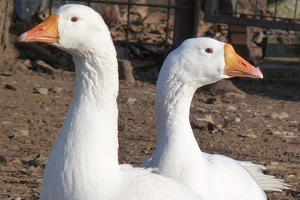Goose feeding by local breeders in Turkey

The objective of this review was to identify the general condition of goose feeding by breeders in Kars province. For this survey villages in Kars, where goose breeding was carried out intensively, were identified and family enterprises that bred geese were interviewed face to face.
A total of 64 questionnaires were obtained out of these interviews. As a result, it was determined that the number of eggs obtained from those stock which were fed on barley and forage before laying eggs was higher than the number of those which were fed on barley and bread (P<0.01); however, feed which was fed during the laying period did not have a significant impact on the number of eggs that were laid (P>0.05).
It was also determined that 36% of the breeders grazed their goslings from the age of 10 days and 53% of the breeders grazed their goslings in meadows until November. Most of the breeders (45%) applied additional feeding to the stock 30 days before slaughter, and mean slaughter weight of geese at the end of the growing period (November) was 4.84 kg. Geese production by conventional methods in Kars uses a more specific feeding program for goslings, while feeding mature geese was not given much attention, and they were only subjected to an additional feeding program based on barley just before slaughter to increase attain desired live weight. It was concluded that by eliminating these shortcomings could improve egg productivity, live weight and slaughter weight.
Purchase report options:
- Purchase this report from Cambridge Journals
- Subscribe to WPSA journal (already a WPSA member)
- Become a WPSA member (word file) (pdf file)













